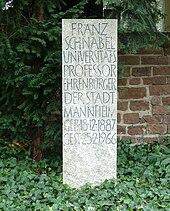Franz Schnabel
In 1910, he passed the Staatsexamen for the teaching profession at grammar schools and was awarded his doctorate in the same year under Hermann Oncken with the thesis The Unification of Political Catholicism in Germany in 1848.
[3] Parallel to his teaching, Schnabel, encouraged by the teacher Oncken, pursued his scientific career and habilitated as early as 1920 at the Karlsruhe Institute of Technology with the paper Geschichte der Ministerverantwortlichkeit in Baden, supervised by Hermann Wätjen.
[6] In the same year 1931, on the occasion of the 100th anniversary of the death of Heinrich Friedrich Karl vom und zum Stein, Schnabel published a brief biography of the Prussian reformer, who was accused by Gerhard Ritter of instrumentalizing Stein for current political purposes; Schnabel and Ritter discussed this question controversially.
[9] Above all, however, Schnabel's main work since the mid-1920s was the Deutsche Geschichte im neunzehnten Jahrhundert, which appeared in four volumes in 1929, 1933, 1934, and 1937.
A fifth volume entitled Das Erwachen des deutschen Volkstums was completed by Schnabel as a manuscript, but could not be published because of the Nazi censorship.
In contrast to most historians of his time, Schnabel had a positive attitude towards the Weimar Republic, which he expressed in public, in lectures, and in his scientific work, but without becoming involved in party politics.
His text Neudeutsche Reichsreform began with the dramatic words: "Even if the discussion should be closed and in the future will only be dictated in the German fatherland, it remains the duty of the spiritual leading class to raise its voice as long as this is possible".
[15] In 1944, Schnabel would almost still have been called up for military service, despite his 57 years in the meantime, but was released through the intervention of the friendly ex-general Bernhard Schwertfeger [de].
[18] Already in the summer of 1945, the Ludwig Maximilian University of Munich approached Schnabel with the question whether he would accept an appointment.
In Munich in early summer 1945, numerous professors had been dismissed under pressure from the American occupying forces, including Heinrich Köhler, who had held the chair of Middle and Modern History.
Schnabel was already teaching as a visiting professor in Munich in the summer of 1947 and took over the chair of Medieval and Modern History, which Walter Goetz had held as a substitute, on 1 November 1947.
"[22] Schnabel's lectures in the Große Aula or in the Auditorium maximum, always held on Monday and Tuesday afternoon for two hours each, always had 800 to 1200 listeners.
It was only in the Munich years that Schnabel was able to train his own academic students, including Franz Herre, Heinrich Lutz, Karl Otmar von Aretin, Friedrich Hermann Schubert, Eberhard Weis, Erich Angermann, Lothar Gall, Hans Schmidt, Peter Hoffmann, Peter Krüger, Adelheid von Saldern and Karl-Egon Lönne.
Schnabel's four-volume Deutsche Geschichte im neunzehnten Jahrhundert was reprinted unchanged between 1947 and 1951, appeared in 1964/65 in an eight-volume paperback edition and was last published by Deutscher Taschenbuch Verlag in 1987.
Thomas Hertfelder vertrat die Auffassung, dies sei "zu Schnabels Glück" nicht geschehen: Schnabel habe in diesem Band in einer Mischung aus Zensur und Selbstzensur liberale Positionen preisgegeben und sich von der westeuropäischen politischen Tradition abgewandt.
[29] Schnabel's great concern after the end of the Third Reich and as a reaction to it was the renewal of the humanistic educational idea, for which his 1955 academy lecture Das humanistische Bildungsgut im Wandel von Staat und Gesellschaft is characteristic.
[32] In 1954, Schnabel was awarded honorary citizenship of the city of Mannheim, and in 1961 he received the Bavarian Order of Merit.
